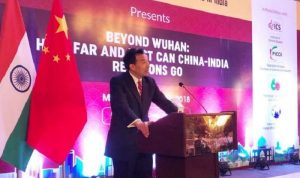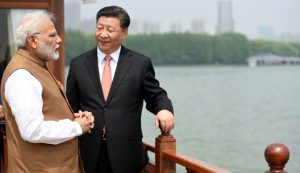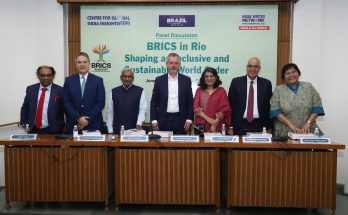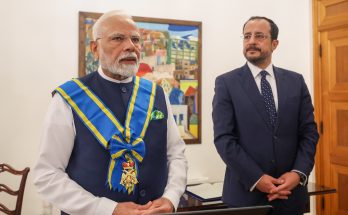 Is it time for a China-India-Pakistan trilateral summit? There are hardly any takers in New Delhi for this radical proposal made by China’s ambassador to India Luo Zhaohui at a conference on mapping the post-Wuhan and post-Qingdao trajectory of India-China relations.
Is it time for a China-India-Pakistan trilateral summit? There are hardly any takers in New Delhi for this radical proposal made by China’s ambassador to India Luo Zhaohui at a conference on mapping the post-Wuhan and post-Qingdao trajectory of India-China relations.
The proposal for a trilateral summit with India and Pakistan under the framework of the Shanghai Cooperation Organisation (SCO) has predictably grabbed headlines, with New Delhi promptly dismissing it, saying there is no role for any third country in its ties with Islamabad. Given the current state of freeze in India-Pakistan relations, the proposal can only be considered unrealistic and was perhaps designed to provoke.
The trilateral-centred headlines, however, detracted the focus from an upbeat picture of India-China relations that was crystallized in the Chinese envoy’s keynote speech as well as in incisive presentations by eminent Indian and Chinese participants at the day-long conference, entitled “Beyond Wuhan: How far and how fast can India-China relations go?,” in New Delhi on June 18.
Beyond DokIam: Bridging Trust
n a realistic vein, the Chinese envoy said that ties between India and China would not be able to take the strain of another Doklam-like standoff, which underlined the centrality of maintaining border peace to ensure a brighter future for India-China relations. He also stressed on the need for the two sides to find a “mutually acceptable solution” on the boundary issue through a meeting of Special Representatives, which will be held later this year.
“We need to narrow differences through expanding cooperation. However, it does not mean that differences would be ignored. The boundary question between our two countries was left over by history. We need to build on convergence to find a mutual acceptable solution through the Special Representatives Meeting while adopting confidence building measures to maintain the peace and tranquillity along the border,” he said. “We cannot stand another Doklam (sic),” the envoy said.
Going ahead, the envoy underscored that enhanced cooperation in multilateral fora will mark India-China interaction in months to come. “We need to enhance coordination and cooperation in SCO, BRICS and join hands to tackle social challenges,” he said. Alluding to a key outcome on joint projects in Afghanistan, that emerged from the informal summit meeting between Prime Minister Narendra Modi and Chinese President Xi Jinping in Wuhan in April, the Chinese envoy said that the two countries have identified a programme to train Afghan public servants and diplomats. “This is a first step and in future, there is more…,” he said.
Against protectionism: Bridging Trust deficit
Amid rising waves of anti-globalization, the Chinese envoy predicted a deepening of India-China front against protectionism. “Against the backdrop of anti-globalisation and rising protectionism, China and India, as major emerging market economies, are faced with the pressure of established powers. We should coordinate our positions and also explore ways to be with each other,” the envoy said without naming the US.
With the trade deficit ballooning to over $63 billion, the Chinese envoy reassured that the outcomes in Wuhan on this front will be implemented. China will import more sugar, non-Basmati rice and high quality medicines from India to reduce trade imbalance, he said.
“We (China) would also like to negotiate a regional trade arrangement with India to expand trade relations,” he added.
Beyond hesitations of history

Looking ahead, given the “complex and multilayered relations,” between India and China, the two rising Asian countries have to firm up a new template of major-power relationships, underpinned by trust and enhanced strategic communication. “Strategic communications, meetings, heart-to-heart dialogues are important. What’s equally important is to implement the consensus, transmit leaders’ personal friendship down to the people, and take more concrete actions,” he said.
Taking a forward-looking view, Ashok Kantha, chairman of Institute of Chinese Studies and a former ambassador to China, stressed on the imperative to move beyond “hesitations and suspicions” of the past to cement this “critical partnership of the 21st century.” “There is a sense of optimism and hope about future directions of this partnership,” he said. There is a need to flesh out and implement the Wuhan Consensus forged between the leaders of the two Asian countries, he said.
Author Profile

- Manish Chand is Founder-CEO and Editor-in-Chief of India Writes Network (www.indiawrites.org) and India and World, a pioneering magazine focused on international affairs. He is CEO/Director of TGII Media Private Limited, an India-based media, publishing, research and consultancy company.
Latest entries
 India and the WorldJune 16, 2025Amid Pakistan-Turkey nexus, Cyprus joins India against cross-border terror
India and the WorldJune 16, 2025Amid Pakistan-Turkey nexus, Cyprus joins India against cross-border terror India and the WorldMay 8, 2025Pahalgam payback: India exposes Pakistan’s lies, misuse of religious sites for training terrorists
India and the WorldMay 8, 2025Pahalgam payback: India exposes Pakistan’s lies, misuse of religious sites for training terrorists India and the WorldMay 3, 2025IMEEC provides a democratic alternative to BRI: Italy’s former foreign minister (Interview)
India and the WorldMay 3, 2025IMEEC provides a democratic alternative to BRI: Italy’s former foreign minister (Interview) India and the WorldApril 21, 20253T Template for India-US Mega Partnership
India and the WorldApril 21, 20253T Template for India-US Mega Partnership







